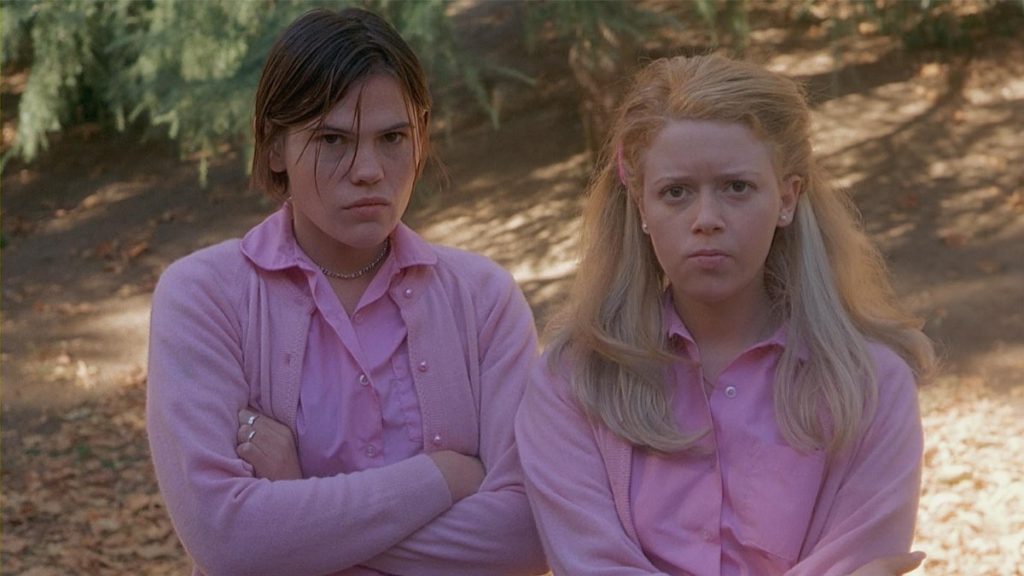20 years ago, the world looked very different, especially in regard to LGBTQ+ rights. 11 months before But I’m a Cheerleader premiered at the Toronto International Film Festival, Matthew Shepard was beaten and tied to a fence, left for dead. Shepard died six days after his attack. The Defence of Marriage Act (DOMA) was law, allowing states to deny recognition of same-sex marriages. The “Don’t Ask, Don’t Tell” policy in the military was closeting LGBTQ+ servicemen and servicewomen.
Over the past 20 years, there have been major triumphant changes. DOMA was deemed unconstitutional, “Don’t Ask, Don’t Tell” has been repealed, and marriage equality is recognized throughout the United States. Yet, there still is more work to be done. LGBTQ+ rights continue to be at risk in the United States and in many countries around the world.
But I’m a Cheerleader was light years ahead of its time. While a small, cult classic film, But I’m a Cheerleader provided satirical and heartfelt commentary on the challenges LGBTQ+ youth face. It fought gender and sexual orientation stereotypes. It subverted our ideas of “gay” and “lesbian” appearance and behavior. And though it is a satirical piece, it is also the only LGBTQ+ rom-com I know to be hopeful and uplifting.
SYNOPSIS
Megan (Natasha Lyonne) is just your average American high schooler. She is on the cheerleading squad. She is dating a football player; she just doesn’t like kissing him. Instead, she prefers to look at the other girls on her cheerleading squad. When her parents learn of her aversion to her boyfriend, paired with her love of Melissa Etheridge and vegetarianism, they decide that their daughter is a lesbian.
To cure her affliction, they send her off to a conversation therapy program that heavily relies on stereotypical gender roles to “cure” people through a five-step program. At first, Megan denies she is a lesbian, but to follow the five steps, she reluctantly agrees to admit she is a lesbian. Due to her religious upbringing, Megan struggles with this admission and tries everything to become a heterosexual.
Things become complicated as she becomes closer to Graham (Clea DuVall). Unlike Megan, Graham is comfortable in her sexuality but agrees to the conversation therapy rather than being disowned by her family.
SUBVERTING THE STEREOTYPE
The film begins to subvert the stereotypical notion of gay and lesbian. While Megan may be a fan of Melissa Etheridge music, much about her is feminine. She is a cheerleader, she wears a lot of pink, she enjoys some tasks assigned to her gender role. Meanwhile, Graham has both feminine and masculine attributes. Likewise, only a couple of the teens in the program fell into the afeminine gay man and “butch lesbian” tropes.
Many depictions of gay and lesbian characters utilized these stereotypes until this film. Even to this day, media struggles with falling into the characterizations of queer people. Writer/Director Jamie Babbit ensured that there was a swath of what queerness looked like to challenge the ideas and previous depictions of the LGBTQ+ community. She also did this by not giving us another tragic LGBTQ+ story.
Even 20 years later, there are few LGBTQ+ films that have a happy ending. We don’t find Megan or Graham tragically dying or resigning to no future together. Instead, Babbit shows two young women in love, hopeful for their future and their relationship outside of the program.
LYONNE + DUVALL = MAGIC
What makes this film work so wonderfully is the chemistry between Lyonne and DuVall. Together, they establish a relationship, first as a friendship, and then allow it to blossom into something more. They are very intune with their characters and very intune with each other. When watching the film, you can tell how much Lyonne and DuVall care about their characters, and furthermore, how much the two actresses care about one another.
But I’m a Cheerleader brought these two actresses together, and the pair have worked on other projects since. (That means, when you are done with watching the films from the festival, you should check out DuVall’s directorial debut, The Intervention.)
BUT I’M A CHEERLEADER
But I’m a Cheerleader remains a timeless cult-classic. It set a bar for LGBTQ+ films that many are uninterested in meeting. Not only does it poke fun at the nonsense with gender roles and stereotyped gender expression, but it highlights the beauty of love and happiness and hope. Society and film have come a long way, but there is still so much we can learn from But I’m a Cheerleader.
But I’m a Cheerleader is available to stream on iTunes.

